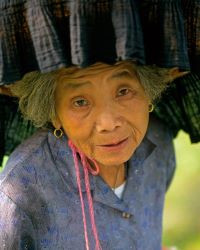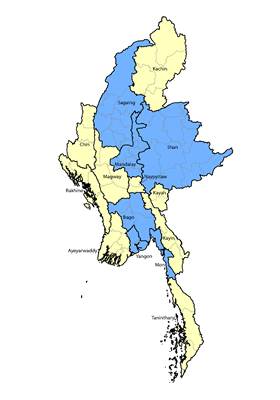Although the Hakka language is markedly different from other Chinese varieties, they have always claimed to be part of the great Han race. In Myanmar the Hakka were given the nickname “Zaka” long ago by the Burmese. It means “mid-length sleeves” and was coined to help locals differentiate them from the dress of other Chinese migrant groups. The Hakka in Myanmar divide into two subgroups: those with ancestral roots in Fujian Province, called “Eingyi shay Hakka” in Burmese, and those from China's Guangdong Province, whom the Burmese call “Eingyi to Hakka.”
Location: More than 23,000 Hakka-speaking Chinese people are scattered throughout Myanmar, with communities found in many areas, including the Mandalay, Bago, Sagaing, and Yangon regions and in Shan State. Some are known to reside in Mawlamyine, the capital and largest city in Mon State. More than 36 million Hakka people inhabit over 200 cities and counties across seven provinces of southern China, and an additional 7.6 million dwell in dozens of countries on every inhabited continent, with Taiwan, Malaysia, Indonesia, Philippines, Singapore, and Thailand boasting the largest Hakka communities.
Language: Despite living in widespread communities across Asia, the Hakka language is marked with high intelligibility and uniformity. The Hakka are proud of their language and say they “would rather surrender the ancestral land, but never the ancestral speech.” As part of the careful preservation of their language, when an outside woman marries into a Hakka family she is required to learn their language.
There is much speculation regarding the historical roots of the Hakka. Some claim they were the first Chinese people to arrive in China, while others say the Hakka are descended from the Xiongnu tribe (known in Europe as the Huns) from around the time of Christ. This much is agreed upon: “At various stages between the 4th and 13th centuries AD, large numbers of people were forced to flee their homes in the war-torn Yellow River valley to seek refuge in southern China. These war refugees came to be known as Kejia (a Hakka word meaning ‘strangers' or ‘guests').” When the savage Mongol hordes swept across China in the 13th century, many Hakka fled south to escape the carnage. Some ultimately made it as far as today's Myanmar.
Chinese communities in Myanmar are generally economically better off than other migrants, with one scholar noting: “The Chinese government, since the late 1980s, has pushed for reforms for the Chinese Diaspora in Myanmar. The Chinese have been well represented in every aspect of Myanmar's society in commerce as well as politics…. Though their number is less than that of the Indians, the Chinese have far greater economic clout, and they own a disproportionate share of the Burmese economy.”
The religion of most Hakka people is a blend of Buddhism, Daoism, Animism, and ancestor worship. As most Hakka families in Myanmar migrated to the country before the Communist Era in China, atheism is not as prominent among them as among other more recent Han Chinese arrivals.
In 1846 the Basel Mission commenced work among the Hakka in China. They experienced steady success, and by 1922 there were 30,000 Hakka Christians.5 While the status of Christianity among the Hakka in Myanmar is difficult to gauge today, it is thought that only a small fraction of them follow Jesus Christ. Most remain firmly entrenched in their traditional culture and religion. Although the Hakka Bible was translated more than a century ago, it is now only used among Hakka people living in Taiwan. The Jesus film is available in Hakka and is a useful resource for evangelizing the Hakka of Myanmar, who remain a people in need of the Gospel.
Scripture Prayers for the Han Chinese, Hakka in Myanmar (Burma).
| Profile Source: Asia Harvest |













